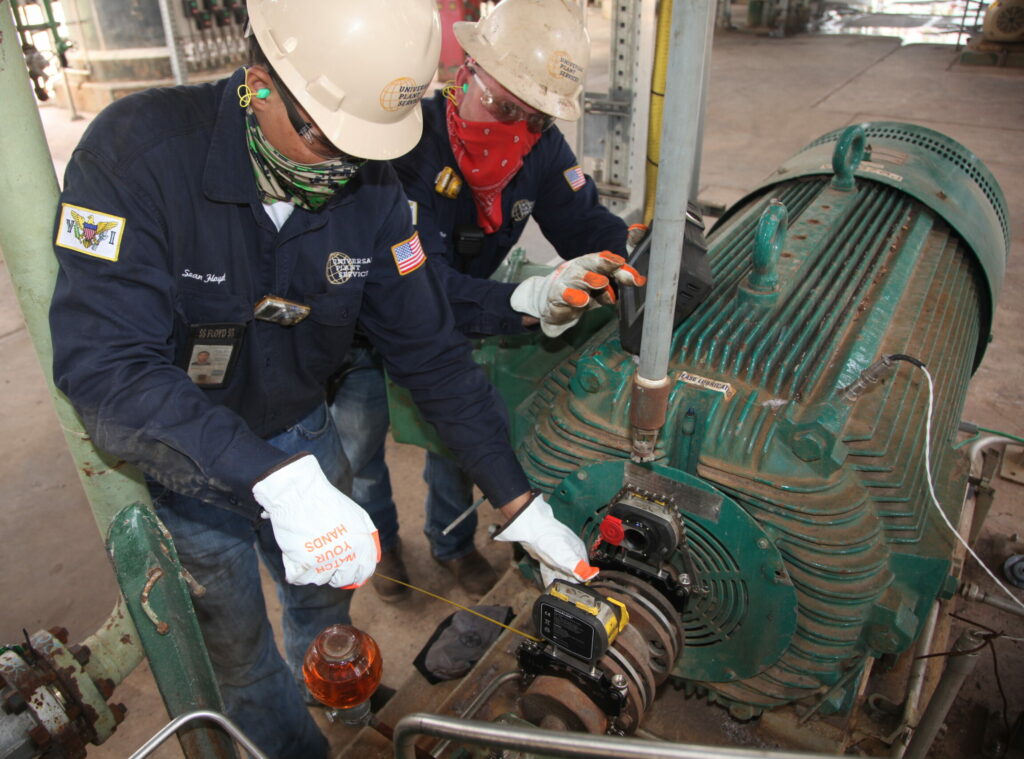Thanks to years of work by hundreds of millwrights from the Southern States Millwright Regional Council, the Limetree Bay refinery in St. Croix, U.S. Virgin Islands, began producing transportation fuel again in February 2021, after an almost-decade-long shutdown. Work to bring the plant back online wrapped up the week of April 26, and millwrights are transitioning to long-term maintenance roles.
The SSMRC partnered with Universal Plant Services, which was responsible for evaluating and repairing a large majority of the rotating equipment at the refinery, to provide millwright manpower for the project. While UPS hired a small pipe-fitter crew and some crane operators and field machinists, most of its employees at the site have been millwrights.
“Millwrights were tasked with inspecting all equipment, finding deficiencies, and repairing them,” said Logan Brown, director of the SSMRC’s Eastern Region. “It was a massive job.”
David Meier, general manager for UPS, said the millwrights have performed well under unique and challenging circumstances. The management for Limetree Bay Ventures recently told him UPS and the millwrights have done “a fantastic job,” Meier continued.
Restarting one of the world’s largest refineries
Producing approximately 500,000 barrels per day, the refinery, which began operating in 1966, was one of the top 10 largest in the world before it shut down in 2012. Limetree Bay purchased the refinery in 2015 and in 2018 announced plans to reopen it. The plant is comprised of east and west ends, and the scope of the project was to restart the majority of the west end. The 200,000-barrel-per-day plant now produces ultra-low-sulfur diesel fuel, gasoline, kerosene, and semi-processed fuels.
Universal Plant Services received a request in early November of 2018 to help with the project. Three weeks later, 23 employees were on site, and by early January of 2019, there were almost 100.
“We couldn’t have done it without the partnership with the Southern States Millwright Regional Council,” Meier said. “We worked well with the union to get that manpower to come down here to this project. .”
At the project’s peak in 2019, UPS had approximately 260 workers at the plant. Currently, 90 employees are at the site.
At least ninety percent of the millwrights who have worked at Limetree Bay refinery are SSMRC members, Brown said. Many are from Local 2232 in Texas and Local 729 in Louisiana due to their experience working in Gulf Coast refineries. A significant number also have come from Local 1000 in Florida.
UPS and the millwrightsinspected, repaired, and reinstalled pumps, fans, blowers, motors, and more. They manned the machine shop, pump shop, and electric-motor shop.
Millwright work
SSMRC millwrights put more than 1 million man-hours into the project between January 2019 and January 2021.
Millwrights inspected gas turbines, steam pumps, compressors, blowers, fin fans, and more, Meier said. They repaired some equipment on site and sent some machines and parts to shops on the mainland. Meier said millwrights overhauled approximately 150 pumps on site, reinstalled about 700 pumps, overhauled about the same number of motors, installed approximately 400 fin fans, six preheaters, and 12 draft fans for furnaces, and worked on numerous compressors.
The strategy was to keep as much of the old equipment as possible and repair it rather than purchase new machinery, Brown said, adding that almost everything had to be rebuilt. Millwrights disassembled equipment, ordered, or made new parts, repaired foundations, reassembled, reinstalled, and aligned the machines.
Winston Tomlinson, a member of Millwright Local 1263, was one of the first millwrights on the job and works in the machine shop. “We repair everything from valves to couplings,” Tomlinson said.
Uncommon obstacles
In addition to the technical challenges, the project faced other unusual hurdles. Transporting parts and materials to and from the island by air is extremely expensive, Meier said, and shipping by boat takes three to four weeks.
Finding millwrights with the necessary compressor, alignment, and pump skills who were willing to travel to the island and stay there for long periods of time was challenging as well, Brown said. Millwrights also had to hold Transportation Worker Identification Credential (TWIC) cards. To help meet the manpower challenge, Local 1000 negotiated higher wage and per-diem rates to make the job more attractive, Brown said. Millwrights could live and eat for free in a Limetree-Bay-owned camp that provided individual rooms with TVs, refrigerators, and bathrooms, a cafeteria, and a gym.
Word spread quickly. Local 1000 Business Agent Cliff Tucker interviewed almost 1,000 people.
During the project, millwrights were divided into two crews: a refurbishment crew and a maintenance crew. Those on the maintenance crew, which grew gradually as parts of the refinery came back online, are required to have National Center for Construction Education and Research (NCCER) level four millwright credentials.
Guy Carter, the millwright instructor for the Florida Carpenters Training Trust Fund, has traveled to St. Croix multiple times to help millwrights study for the test. Through a partnership with the St. Croix Career and Technical Educational Center, Carter began teaching classes in the center’s millwright shop regularly in May. He’s helping apprentices who haven’t left the island in six to eight months catch up with their training and helping locals study for and pass the NCCER level four test so they can join the maintenance team.
COVID concerns
COVID-19 also presented manpower and logistics challenges. Initially, border closings prevented some millwrights from going on their scheduled furloughs while keeping others from returning to the island.
Before workers can leave the island, they have to take a COVID test, and when they return, they must quarantine. Regular COVID anti-body testing was conducted as well.
Millwrights were supposed to go home for 10 to 14 days every three months, but COVID disrupted that schedule. Tomlinson and his wife bought a house in Buford, Georgia, in February of 2020, then he returned to the island in March. He didn’t get to go home until September but said he was fortunate to continue working during the pandemic.
UPS-SSMRC partnership
Meier said he attributes Universal Plant Services’ winning of the long-term maintenance contract to the quality of the SSMRC millwrights’ work. UPS will continue to man the pump shop, the machine shop, and the motor shop.
“This is a testament to our performance,” Meier said.
Jeff Wester, technical advisor and project manager for Universal Plant Services, agreed. “I’m proud to be part of such a big undertaking that has brought UBC millwrights from across the states together,” he said. “They have performed at the top of their game.”
Tomlinson said he has greatly enjoyed working for UPS. “I’m on a very good crew,” he said. “I just so happen to be working with their genius, my foreman, Christopher Barny. He used to teach over at Exxon Mobile, and he’s very familiar with machining and pumps. He is their go-to guy when it comes to troubleshooting. So it’s been a pleasure to come on, not knowing much about pumps, but knowing a lot about tolerances and how to set things up properly, and to be under his wing.”
Maintenance going forward
the SSMRC is hoping to recruit more locals for the maintenance crew. The St. Croix Career and Technical Educational Center (C-TEC) has a three-year millwright program for high school students, and four former students are already working for UPS at Limetree Bay. One is working for the company on the mainland. With the Florida millwright training center leasing classroom space at C-TEC, more Local 1000 apprentices are expected.
Some SSMRC members also have relocated to St. Croix and purchased houses, Brown said. “It’s a very beautiful place – the water, the beaches, the temperature,” he said. “If you like the beach and the ocean and you like snorkeling and scuba diving, it is definitely the place for you.”
Long term, the SSMRC would like to fill maintenance positions at the refinery with locals. “That will provide a stable workforce, lessen turnover, build the membership, and provide good-paying jobs with health benefits,” Brown said.
Tomlinson has committed to at least one year on the maintenance crew. He said the job has been a perfect fit for him and will help advance his career. “I really wanted to get into oil and gas machining, and I wanted to work with a good crew,” he said. “UPS definitely has prospects for the future, and they know what they’re doing. It was an opportunity to get a lot more experience.”


